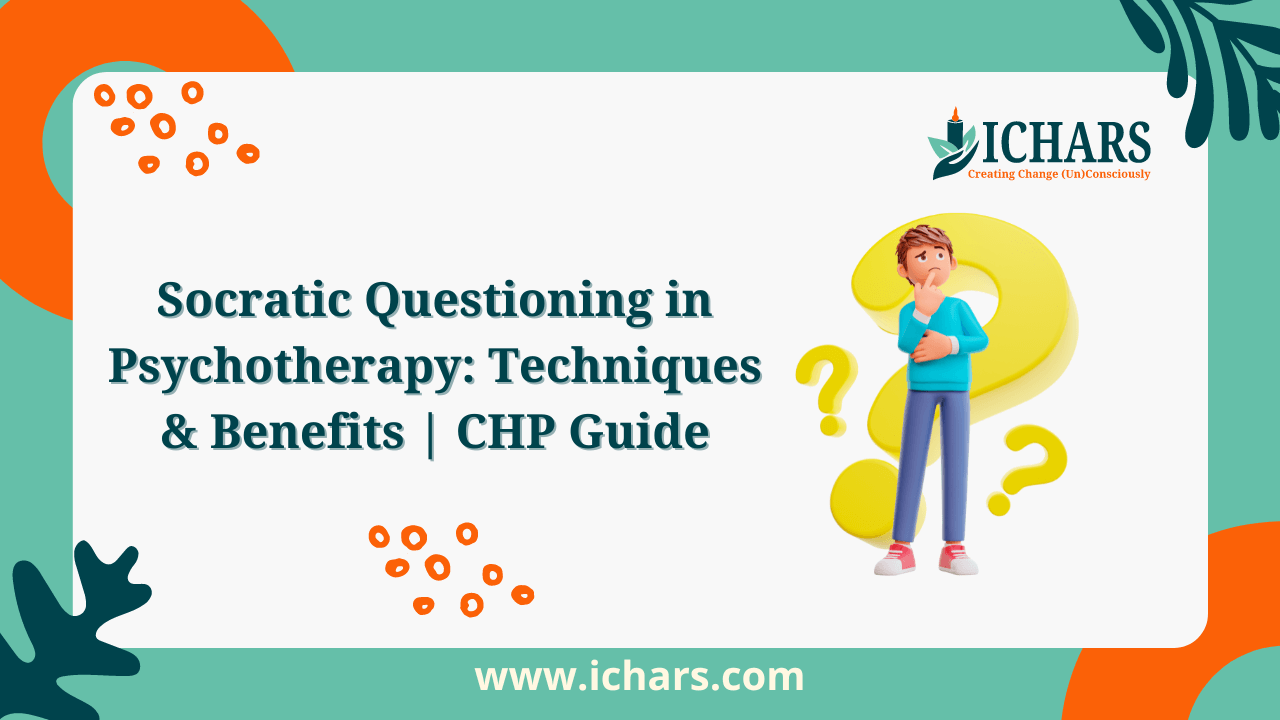Socratic questioning, rooted in the philosophical method of Socrates, has evolved into a pivotal technique within Cognitive Hypnotic Psychotherapy (CHP). It serves as a dynamic tool to foster critical thinking and self-discovery in therapeutic settings, guiding clients towards profound insights and sustainable behaviour change.
Theoretical Foundations
Socratic questioning integrates seamlessly with cognitive, behavioural, and mindfulness-based theories, making it a versatile approach in CHP. By challenging automatic thoughts and exploring underlying beliefs, therapists facilitate deep introspection and adaptive responses to emotional challenges.
Key Principles of Socratic Questioning
At the heart of Socratic questioning lies the art of inquiry designed to build rapport and trust while nurturing client autonomy. Therapists use various types of questions strategically to facilitate exploration and insight:

- Clarifying Questions: These questions seek to clarify meanings and promote deeper understanding. Examples include: “Can you clarify what you mean by…?” or “How does that relate to what we were discussing earlier?”
- Probing Assumptions: By probing assumptions, therapists encourage clients to examine the underlying beliefs guiding their thoughts and behaviours. Questions might include: “What assumptions are you making about…?” or “How did you arrive at that assumption?”
- Exploring Perspectives: These questions help clients consider alternative viewpoints and broaden their understanding of a situation. For instance, therapists might ask: “How do you see this situation from another person’s perspective?” or “What might someone else think or feel in this situation?”
- Examining Evidence: Questions about evidence prompt clients to evaluate the basis of their beliefs and behaviours. Therapists might ask: “What evidence supports your belief/thought?” or “How reliable is the evidence you’re basing this on?”
- Considering Consequences: By exploring consequences, therapists help clients evaluate the outcomes of their thoughts and actions. Questions include: “What are the potential consequences of thinking/behaving this way?” or “What would happen if you continued to think/act in this manner?”
- Identifying Implications: These questions encourage clients to reflect on the broader implications of their beliefs and behaviours. Examples include: “What does this belief/behaviour imply about your values or priorities?” or “How does this belief/behaviour affect your relationships or goals?”
- Reflecting Emotions: Questions about emotions prompt clients to explore the emotional undercurrents influencing their thoughts and behaviours. Therapists might ask: “What emotions are you experiencing in this situation?” or “How are these emotions influencing your thoughts and actions?”
- Encouraging Self-Reflection: Self-reflective questions help clients connect their current experiences with past learning and future goals. Examples include: “How does this situation connect with your past experiences?” or “What might this situation be teaching you about yourself?”
- Challenging Limiting Beliefs: These questions challenge clients to consider alternative perspectives and possibilities. Therapists might ask: “Is there evidence that contradicts this belief?” or “How might someone else interpret this situation differently?”
- Promoting Goal Setting: Questions about goals encourage clients to envision desired outcomes and identify actionable steps. Therapists might ask: “What outcome or result are you hoping to achieve in this situation?” or “What steps could you take to move closer to achieving your desired outcome?”
Application of Socratic Questioning in Therapy
Practical application scenarios illustrate the versatility of Socratic questioning across different therapeutic contexts within CHP:
- Anxiety Treatment: In treating anxiety, therapists use Socratic questioning to challenge irrational fears and explore adaptive coping strategies. Questions like “What evidence supports your fear?” or “What would happen if you faced this fear?”
- Depression Therapy: For clients experiencing depression, Socratic questioning helps uncover and reframe negative self-beliefs. Therapists might ask, “What evidence supports your belief that you’re worthless?” or “What would a compassionate friend say about these thoughts?”
Each session becomes a collaborative journey of exploration, empowering clients to navigate their internal landscapes with newfound clarity and confidence.
Benefits and Outcomes

The use of Socratic questioning within CHP helps practitioners develop powerful questioning skills that yield transformative outcomes, enhancing client insight, self-awareness, and emotional regulation. By empowering clients to recognize and modify unhelpful thought patterns and behaviours, therapists facilitate lasting behaviour change and emotional resilience. These outcomes are pivotal in promoting sustainable well-being and personal growth.
Challenges and Considerations
Navigating client resistance and ethical considerations is crucial when employing Socratic questioning. Sensitivity to individual client needs and cultural contexts ensures that questioning techniques align with therapeutic goals while respecting client autonomy and values. Therapists adept in navigating these challenges foster a supportive therapeutic environment conducive to profound personal insights and positive therapeutic outcomes.
Conclusion
Integrating Socratic questioning into Cognitive Hypnotic Psychotherapy enriches therapeutic practice by fostering deeper client engagement and promoting meaningful self-discovery. This approach empowers therapists to facilitate transformative change, enhancing client resilience and well-being. By embracing Socratic questioning within CHP, psychologists advance their therapeutic skills, positioning themselves as effective agents of positive change in their clients’ lives.
This enhanced guide provides psychologists with a comprehensive framework for effectively integrating Socratic questioning into Cognitive Hypnotic Psychotherapy. By incorporating practical examples, addressing cultural considerations, and providing actionable recommendations for training and development, the guide equips practitioners with the tools and insights needed to enhance therapeutic outcomes and client satisfaction.

